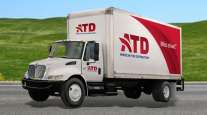Tire Manufacturers Boost Prices as Rubber, Oil Costs Increase
This story appears in the Feb. 7 print edition of Transport Topics.
Truck tire manufacturers have raised prices up to 12% in recent weeks, citing materials costs, while concern is mounting about future supplies after the sudden rise in new tractor and trailer sales.
Increases by Bridgestone Bandag LLC, Yokohama Tire Corp., Michelin Cie., Continental Tire, Goodyear Tire & Rubber Co. and Double Coin have been reported.
Prices for two key tire ingredients — natural and synthetic rubber made from petroleum — have risen dramatically, Kevin Rohlwing, senior vice president of the Tire Industry Association, told Transport Topics. Rubber has nearly quadrupled in two years to $2.15 a pound and oil has surged above $90 a barrel.
“Unfortunately, severely escalating raw material costs, as well as energy and other costs related to manufacturing, have made a price increase of this level unavoidable,” said Kurt Danielson, president of Bridgestone Bandag, Abilene, Texas, in a statement last week announcing an immediate 12% increase.
The resurgence of truck and trailer sales wasn’t anticipated, either.
“Most [tire] manufacturers reduced capacity and idled plants to manage their inventory” last year, Clif Armstrong, marketing director for Continental Tires the Americas, Fort Mill, S.C., told TT. “2010 caught everyone by surprise. The market prediction for [equipment production] growth was low single digits, but the growth percentage ended in the high teens.”
“Our estimates show that current industry inventory levels are at an all-time low and production capabilities are limited due to shortages in raw materials,” said Rick Phillips, director of commercial sales for Yokohama Tire, Fullerton, Calif. “Given these factors, we see a strong possibility that tire demand could outweigh supply for the next couple years.”
Phillips said demand rose last year from 2009, and that he expects that to continue in 2011 because of pent-up demand to replace an aging fleet and rising OEM production.
The increases began to take effect on Dec. 1, and reports of the increases first became public in November, with an announcement from Yokohama.
Yokohama raised prices up to 6%, while Continental levied an increase of up to 8%.
“In 2010, we announced four increases,” said Aaron Murphy, first vice president of China Manufacturing Alliance, the U.S. unit of Double Coin Holdings Ltd. “We are feeling the pressure and invariably will require additional increases soon. Unprecedented raw material increases are pricing production costs globally. Unfortunately, we are not immune to these factors.”
Michelin raised prices an average of 8% as of Dec. 1.
Goodyear did not respond to requests for comment from TT about its pricing actions by press time.
Others are noting the pressure as well.
“Tire prices are too damn high,” said Duane Kyrish, a Navistar dealer and owner of Longhorn International, Austin, Texas, who estimated the average increases at about 10%. “We own a lot of leased trucks and tires are one of the biggest expenses we have.”
He explained that tire expenses are figured into the lease cost, and increases can’t easily be recovered.
“Commodity prices are going up worldwide,” he said, expressing concern about effects of inflation that are apparent in his business even though the U.S. government says inflation remains low.
Bob Lee, president of Roady’s Truck Stops, New Plymouth, Idaho, raised another concern.
“The bigger question is, ‘Can I get inventory?’ ” Lee told TT.
He said Double Coin notified him that there may be shortages this year, though he said the Chinese tire maker hopes to be able to keep up with demand.
“We’ve got 12% pretty much across the board from at least two manufacturers — Goodyear and Bridgestone,” said Jerry Hein, who manages Dart Transit’s on-highway vehicle breakdowns. “I know that I’ve got the price increase coming from Yokohama and Michelin.”
“What they’re telling me is that it’s the price of rubber more than anything,” Hein said. “A lot of people are blaming fuel.”
Before the increase, a steer tire cost about $350, Hein said. That means prices will rise at least $35 after a double-digit increase. The increases are more than double the typical 3% to 5%, he said.
Last year, supply was tight as well, Lee added.
“We saw a lot of Double Coin in 2010 when we couldn’t get rubber from others,” he noted
The price increases don’t directly affect Roady’s, he explained, because the prices major fleets pay are set through their national account contracts.
Rubber prices could spike even higher, based on the rise to a record set last week on the Tokyo Commodity Exchange, Bloomberg News reported. That price, based on a July-delivery contract, is about $2.50 a pound.
Rubber prices now are about 50% higher than they were when crude oil hit its all-time high of $147 in 2008, Rohlwing said.
Staff reporter Daniel Leone contributed to this report.




